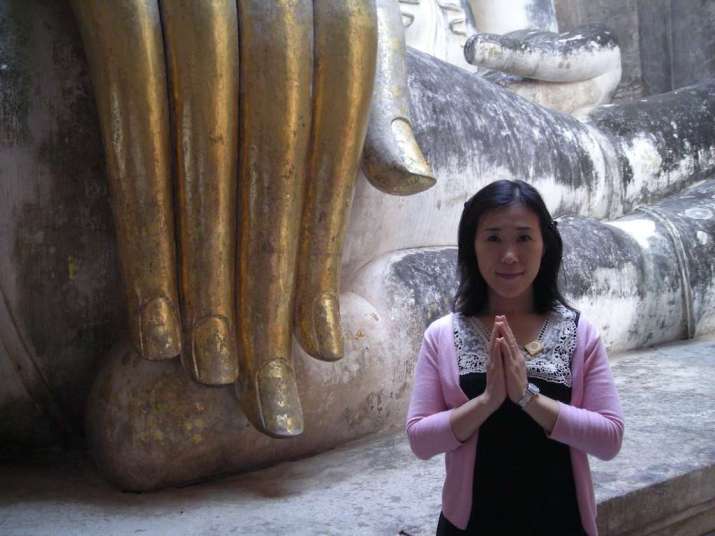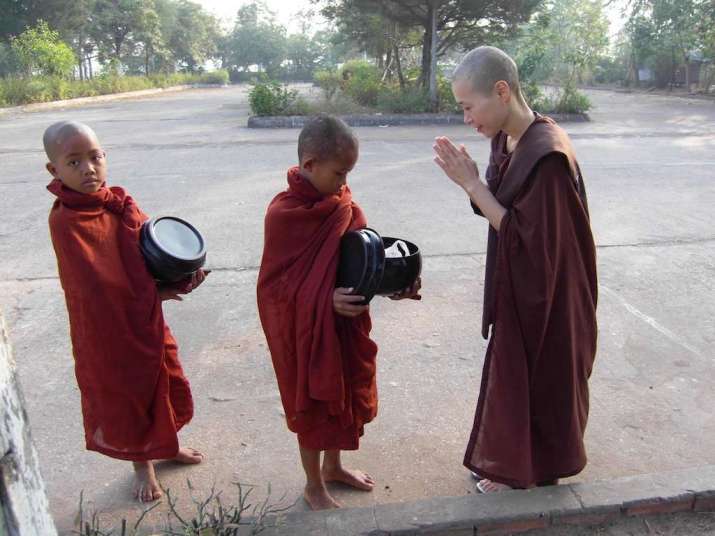FEATURES|VEHICLES|Theravada
Dr. Kanae Kawamoto Discusses Theravada, Buddhist Studies, and Healing Society
 Kanae Kawamoto in Sukhothai, Thailand. Image courtesy of Kanae Kawamoto
Kanae Kawamoto in Sukhothai, Thailand. Image courtesy of Kanae Kawamoto“I’m a very practical-minded person who likes communication and working with people,” says Kanae Kawamoto, a newly minted doctor of philosophy in Buddhist Studies. A Ryukoku University scholar with a focus on Theravada Buddhism, she’s among an emergent generation of academics keen to examine the problems besetting their societies in an innovative and practical way. Recently, she presented her research interests at the 18th International Association of Buddhist Studies (IABS) Congress in Toronto, where I had the opportunity to interview her.
Kanae’s academic journey began when she found a book about Theravada meditative practices and became more involved in vipassana, discovering that it had an immediate and beneficial effect on her mind. Vipassana might lack the abstract or philosophical subtleties of Zen, but its “visibility” and physicality were very appealing, from focusing on the breath to Mahasi Sayadaw U Sobhana’s Mahasi method that examines the expansion and movements of the belly. “Just observe breathing in and out. Be watchful. This helps to reorient ourselves to mindfulness—we are multi-taskers and our minds are very distracted these days,” Kanae describes.
Her initial motivation to enter Buddhist academia can’t be separated from the personal pain she felt when three close friends committed suicide. She had already earned a BA in Buddhist Studies, but worked in music for a decade. Her second BA in Buddhist Studies was formative because she completed it at Myanmar International Buddhist University in Yangon. She would go on to spend a total of three years in Myanmar and another three in Thailand.
She interviewed 18 monks who worked with suicide prevention in Japan for her graduate studies. “Suicide is a major problem in Japan, and so I chose it for my MA and PhD,” she recalled. “I felt that doing a study about what the Buddha said about suicide in the early Theravada texts was something that I could do for them [my deceased friends].” By the end of her research, she concluded that the Buddha never condemned those who committed suicide even if he cautioned against it. “Vinaya rules apply only to the living but cannot punish the dead. I think I did my best and I don’t regret anything.”
Having moved on from her initial motivation and academic focus, her scholarship now focuses on anthropology and cultural studies. She is particularly fascinated by the Thai lore of the ghost Mae Nak Phra Khanong, who is popularly seen in Thailand as a symbol of loyalty and marital love that endures beyond the grave.
 Kanae Kawamoto as a Buddhist nun. Image courtesy of Kanae Kawamoto
Kanae Kawamoto as a Buddhist nun. Image courtesy of Kanae KawamotoHer time in Southeast Asia compelled her to continue her Theravada studies after returning to Japan, a country that has enjoyed its own unique and rich expression of Mahayana and tantric Buddhism for centuries. However, the institutional expressions of these Buddhist doctrines (Mahayana and tantric Buddhism) are not without their issues. Many Japanese people simply don’t have much time for faith and religious practice. Since 2008, all the professed believers of the three major Japanese religions; Japanese Buddhism, Shinto, and Christianity, together don’t even make up 40 per cent of the population. Kanae points out several long-standing problems with the Buddhist institutions, the most prominent being the sense of disillusionment and cynicism felt among otherwise earnest spiritual seekers. In contrast to the “businesslike” atmosphere of the traditional Japanese temples, “Theravada monks just give Dharma talks and meditation instructions when visiting Japan, they don’t go to the dances or festivals.” This in itself feels refreshing for many.
Japanese Buddhist monks are aware and worried about these perceptions, and many among the country’s ecclesiastic families (which own sprawling temple complexes and generally pass on the monastic properties from father to son) have tried different means to attract followers to replenish shrinking congregations. They range from the sober, such as counseling services, to the quirky, such as developing cute, anime-style mascots for their temples to attract tourists. Yet their methods are mostly based on promoting the Buddhist culture, rather than disseminating the teachings through Dharma talks. Kanae does not totally reject the cultural approach, but she’s not so sure that the temple heirs, who live a very secure life, are well-positioned to respond effectively to social problems without a significant change in attitudes and training.
Such opinions might flout conventions and expectations in Japan. Theravada Buddhism is certainly a minority religion in a society that doesn’t engage so much in its own spiritual heritage, let alone that of Southeast Asia. But Theravada movements are gaining modest ground, with several organizations having been established in Tokyo. One of these is Parami Friends, where she worked as a translator and whose members she keeps in touch with.
“In the coming years I want to start something that has to do with helping others who feel alienated from society,” she says, and her words reflect her own personal experience. “We have many people who are struggling with severe personal problems. It might be divorce, being fired from jobs, family disputes, stress, and so on. We’ve suppressed openly discussing an honestly assessing of individual neuroses and issues.” She hopes that her future work on culture, like film and literature, might be able to stimulate new conversations that become forums for open reflection.
Related features from Buddhistdoor Global
Building Communities and Cultivating Networks in the Field of Buddhist Studies
18th IABS Congress Showcases the Vitality and Global Reach of Buddhist Studies
Related news from Buddhistdoor Global
Buddhist Temple in Japan Opens its Doors to Cosplaying Visitors
MBA Monk Aims to Rejuvenate Japan’s Buddhist Temples
Japanese Priest Serves Up Pure Land Buddhism with Techno Beats















in these times. If one can find a way to help even one person in this instance, a very good
deed will have been done.